BBM MARCOS BEWARE: Duterte's clan army in Davao Philippines, INSIDER IN YOUR MIDST AND AGAINST YOUR PRO WESTERN POLICIES
Monday's all-but-official election of Ferdinand Marcos Jr. to become the next president of the Philippines will hold significant implications for Manila's foreign policy. Marcos, known as Bongbong, is likely to be influenced by the policies of both his father, former dictator Ferdinand Marcos, and his predecessor, Rodrigo Duterte, yielding a new government interested in engaging China while keeping the United States close by. Marcos has consistently lauded his father's achievements, one of which was maintaining a strong security alliance with Washington in spite of bilateral frictions, and he is politically aligned with Duterte, who sought to pivot away from the United States to China. Thus, over his term of six years, Washington should expect a kind of Duterte-light leader who is China-friendly but who does not have the expressed intent, as Duterte did, of dismantling the Philippine-U.S. alliance. Indeed, he might even bolster it if Beijing's assertiveness in the South China Sea continues to rise.
Because Marcos refused to participate in most presidential debates during the campaign and did not release any official foreign-policy statements, analysts have largely been forced to read the tea leaves to determine his exact position. He did, however, participate in one major debate and a few media interviews this year that covered foreign policy at length. On these occasions, Marcos's responses to questions on Philippine foreign policy offer the clearest sense of what he will look to achieve on foreign policy when he takes over from Duterte on June 30.
At the very highest level, Marcos, like every Philippine leader, seeks to maintain his country's national interests regardless of deepening U.S.-Chinese competition. During the debate, he said: “No matter what the superpowers are trying to do, we have to work within the interest of the Philippines. We cannot allow ourselves to be part of the foreign policy of other countries. We have to have our own foreign policy.” This statement suggests that he envisions Manila as neither wedded to the alliance with Washington nor forging a new partnership with Beijing. Rather, he wants to steer a middle path to navigate intensifying great-power competition. By contrast, Duterte, on his first trip to China not long after his election, famously announced it was “time to say goodbye” to Washington. Despite his political alignment with Duterte, Marcos probably won't be choosing a side.
Marcos, like every Philippine leader, seeks to maintain his country's national interests regardless of deepening U.S.-Chinese competition.
Regarding what he hopes to achieve on China policy, Marcos underscored in the debate that the Philippines is in a “hot spot” when it comes to geopolitics. However, he also argued that Manila “will not cede any one square inch to any country, particularly China, but will continue to engage and work on our national interest.” Marcos's resolve to defend Philippine national sovereignty and territorial integrity against China in the South China Sea—where the two nations have many overlapping claims and have increasingly been at loggerheads in recent years—is striking relative to Duterte's unabashed pro-China stance on these challenges early on in his tenure. For instance, it took Duterte's government four years to finally acknowledge the 2016 Permanent Court of Arbitration ruling in Manila's favor on Beijing's expansive claims in the South China Sea—a victory not just for the Philippines, but for international law and norms of maritime behavior. Marcos has been neutral on the ruling itself, simply stating that because China rejected participating in the arbitration in 2013, “it's no longer available to us.” This should not be interpreted as a rejection of the ruling but a recognition of the difficulties in enforcing it without Beijing's cooperation.
Although it is well known that Marcos and his family maintain close ties to the Chinese Communist Party, the new president has also voiced concern over China's rising assertiveness against the Philippines in the South China Sea. During the debate, he noted, “It should not be hard to point out to China that our fishing boats are not a military threat to them, so why should they deploy warships there? But we have to respond. If it happens again, we can send the Navy or even Coast Guard, so there's a military presence … a presence of the state in that area.” The fact that Marcos highlighted the need for “a presence of the state” in disputed areas strongly suggests he seeks to leverage the U.S.-Philippine alliance to deter China, since any attack on Philippine state assets would necessarily trigger the Mutual Defense Treaty. Washington's policy on this point has been consistent for years.
During the debate, Marcos also argued for showing resolve in the South China Sea. He said the objective “is to show to China that we are defending what we consider our territorial waters and [the objective] is not to fire upon the Chinese vessels.” He further contended that Manila needs to “make [the Chinese] aware that we know what they are doing and we don't agree with what they are doing, and we carry on with our diplomatic channels, other channels, to fix the problem so it won't happen again.” Yet again, Marcos's statements on China are far more hawkish than Duterte's were, both early on and throughout most of his tenure.
On the U.S. alliance, Marcos has likewise distinguished himself sharply from Duterte. In answering a question at the debate, he noted, “Our relationship with the United States is not something to be cavalier about.” He further referred to the alliance as “a very important one.” He argued that the alliance “has stood us in good stead for over a hundred years and that will never disappear from the Philippine psyche, the idea and the memory of what the United States did for us and fought with us in the last war.” Marcos's intentions appear to be the exact opposite of Duterte's, who sought to systematically dismantle the alliance, one agreement at a time—including the Visiting Forces Agreement, the Enhanced Defense Cooperation Agreement, and even the Mutual Defense Treaty itself. That is a good thing for Washington and almost certainly represents a nod to the elder Marcos's prioritization of the alliance. Indeed, the days of dredging up the United States' dark colonial legacy in the Philippines may end with Duterte's tenure.
To be sure, Marcos, like Duterte, may still wish to explore renegotiating certain aspects of the alliance. During the debate, he noted, “I think any of these agreements we should, of course, encourage as long as it is very clear to us: What is the advantage for the Philippines?” Hence, it is possible that Marcos's future defense secretary, whoever he or she may be, will follow in the footsteps of outgoing Defense Secretary Delfin Lorenzana, who repeatedly called for a “review” of the Mutual Defense Treaty. But if Marcos's government does launch a review process, it will likely be in good faith to improve Manila's benefits within the alliance rather than trying to find ways to terminate it. Either way, Marcos is unlikely to seek U.S. support against China unless absolutely required. In one interview, he said, “The problem is between China and us. If the Americans come in, it's bound to fail because you are putting the two protagonists together.”
Unlike Duterte, Marcos appears to highly value the U.S. alliance.
Marcos's hesitance to involve the U.S. military in future potential conflicts with China should not be a source of concern in Washington. Unlike Duterte, Marcos appears to highly value the alliance. In fact, he might be arguing for Manila to do more on its own—a development, if it comes to pass, that should be embraced by Washington. It would fit neatly into the Biden administration's strategy of so-called integrated deterrence, in which U.S. allies and partners work together to deter China and other adversaries, such as Russia.
Of course, all these statements are just that—statements. Marcos will have to match his words with deeds in the coming years to demonstrate that he actually plans to defend Philippine sovereignty against China and prioritize the U.S. alliance. It is likely he will do both, not least because of the overwhelmingly pro-U.S. sentiment among the Philippine population, the military leadership, and other constituencies. These basic facts of Philippine politics—coupled with Beijing's rising assertiveness against Manila's interests in the South China Sea, which shows no signs of abating—made Duterte's pro-China gambit politically dead on arrival. Hence, Marcos is likely to tweak Duterte's foreign policy just enough to avoid the same pitfalls and maximize the strategic benefits to the Philippines.
What the Marcos' return to power means for the Philippines
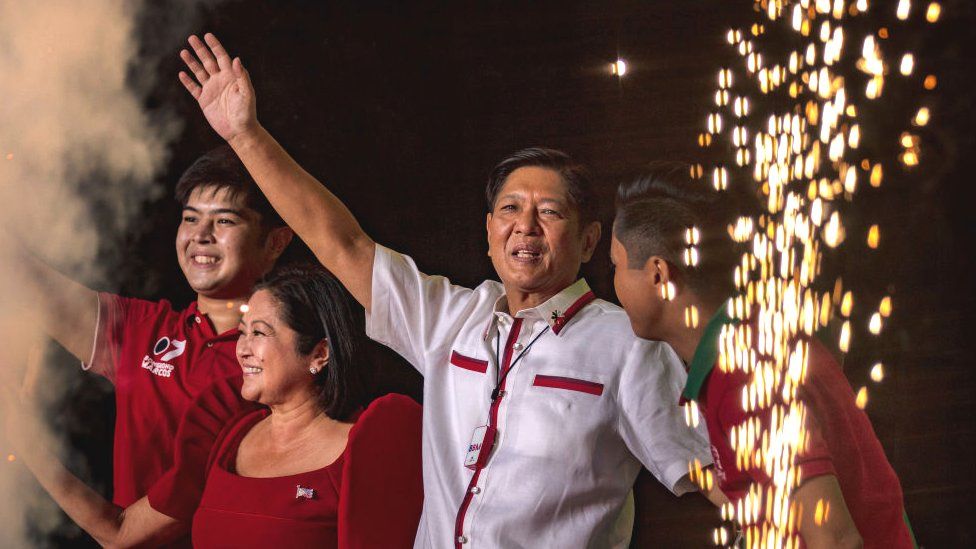 GETTY IMAGES
GETTY IMAGESHistory has come full circle in the Philippines.
A ruling family which was driven out of power 36 years ago, accused of spectacular greed and brutality, is all but set to return to Malacañang - the presidential palace.
It is a stunning blow to those in the Philippines who have campaigned for accountability for the abuses of the old Marcos era. The Marcos family has never apologised for those abuses, nor given back much of the treasure they are accused of stealing from the national purse.
How has Ferdinand "Bongbong" Marcos Jr done it? And what are the implications for the 110 million people of the Philippines, and for its place in the world?
Lies and distortion
In 1986, public anger towards the Marcos regime saw Ferdinand Marcos and his family toppled and forced out of the Philippines.
But after just five years in exile, the family returned - and immediately began making their way back into political circles.
Bongbong has been almost continually in office since the age of 23, aside from his time abroad. Winning the presidency is something he has been preparing for all his life.
Other members of his family have also held various political offices since they were allowed to return to the Philippines, including his mother Imelda and his older sister Imee. Imelda even contested the presidency just a year after coming back in 1992.
They have also benefitted greatly by aligning themselves with another powerful family, the Dutertes. Rodrigo Duterte is the current president of the Philippines.
This brought together the Marcos' fiefdom in the provinces of Ilocos Norte and Leyte in the north and centre, together with the Dutertes' stronghold of Mindanao in the south.
"If I'm going to put a number on it that's at least 50% of the reason he has come this far," says political strategist Alan German. "The Duterte machinery is strong, he is a well-loved president."
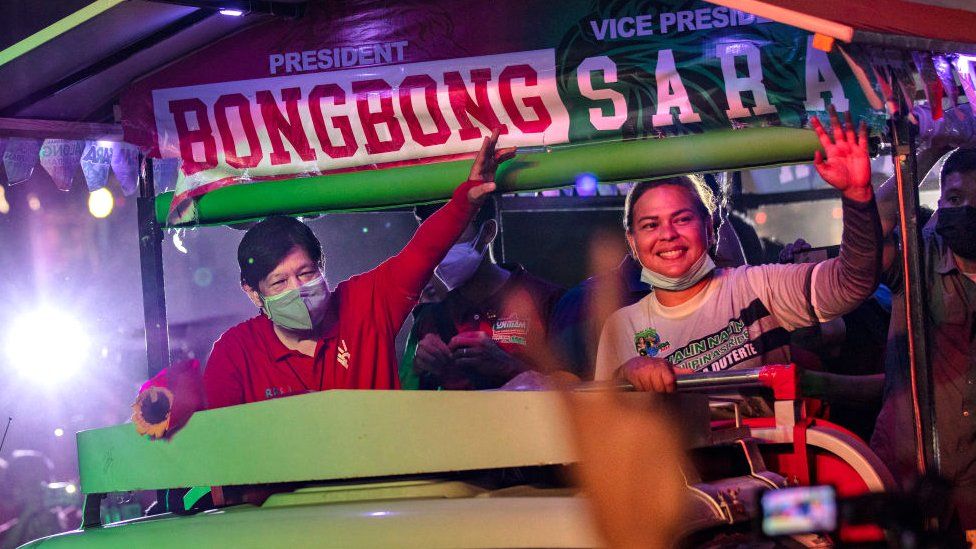
Then there was the social media campaign to rebrand the old Marcos era - not as a period of martial law, with its terrible human rights abuses, corruption and near-economic collapse - but as a golden age of crime-free prosperity.
This began at least a decade ago, with hundreds of deceptively-edited videos being uploaded to Youtube, which were then reposted on sympathetic Facebook pages.
These persuaded millions of Filipinos that the vilification of the Marcoses after their downfall was unfair, that the stories of unrivalled greed were untrue.
"There's a spectrum of lies and distortion in these videos," says Fatima Gaw at the University of the Philippines Department of Communications Research.
"There is outright denial of the atrocities of the martial era. There's also a lot of distortion, claims of economic progress during the so-called golden years of the Philippines, by cherry picking particular details."
And then there are the myths, widely believed in poorer parts of the Philippines, that the Marcoses do indeed hold vast wealth in offshore accounts or hidden stashes of gold bullion, but that these are being kept to benefit the Filipino people once they are restored to power.
Collaborative fact-checking venture Tsek.ph found that up to the end of April, 92% of online disinformation about the Marcos campaign was in its favour, whereas 96% about his main rival, Vice President Leni Robredo, was negative - including some nasty slanders against her.
But the pro-Marcos disinformation campaign has also benefited from widespread public disappointment over the failure of the post-1986 administrations to bring significant improvements to the lives of poorer Filipinos.
Bongbong has successfully portrayed himself as the candidate for change, promising happiness and unity to a country weary of years of political polarisation and pandemic hardship, and hungry for a better story.
By staying away from all the presidential debates and refusing media interviews, he avoided having his family's record challenged, and was able to maintain the illusion of harmony, despite millions remaining opposed to his presidency.
The fact that he faced so many rivals was also a significant advantage. The anti-Marcos vote was divided among nine candidates, and the strongest among them, Leni Robredo, declared late, giving her unusually spirited campaign little time to counter the powerful Marcos narrative.
The fate of democracy
So what can we expect from the Marcos presidency? He spoke little about the details of his policy platform while campaigning, which in any case is an unremarkable list of promises, largely to continue the policies of President Duterte.
One obvious concern is what happens to the efforts to recover the money allegedly stolen by the Marcoses when they were last in power.
The Presidential Commission on Good Governance (PCGG), established after the 1986 uprising, has recovered about one third of the $10-15bn of so-called "ill-gotten wealth" - including jewellery, valuable paintings and Imelda's famous shoes - but is officially still pursuing the rest.
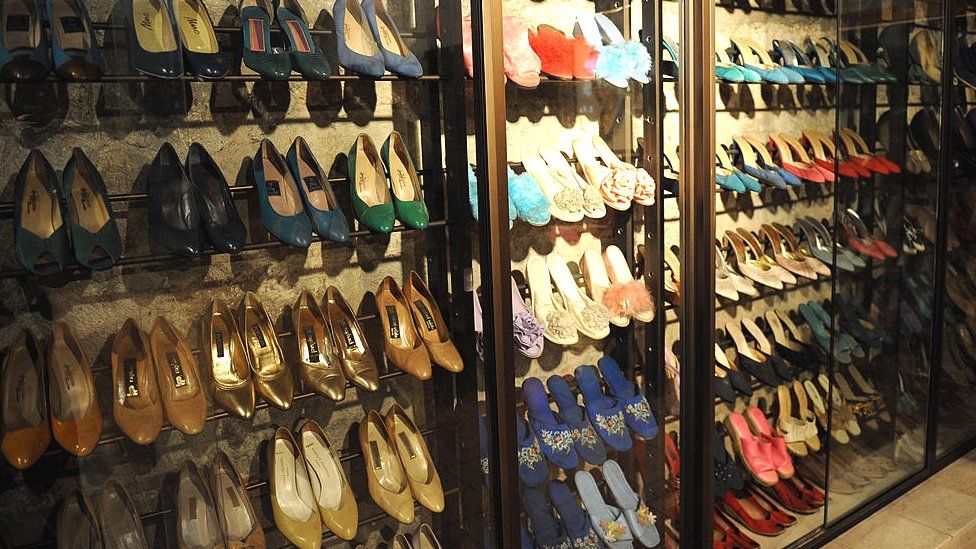
Bongbong has suggested that he would widen the PCGG's remit to include other families, but given the limited progress in holding the Marcoses to account while they were out of power, it is hard to imagine much progress now they are back.
There is also the matter of unpaid tax on the Marcos estate - Bongbong was found guilty of failing to file a tax return in 1995.
And there's a verdict in the United States that he is in contempt of court for failing to pay reparations to victims of his father's human rights violations, which will make any official visit to the US, a treaty ally of the Philippines, tricky.
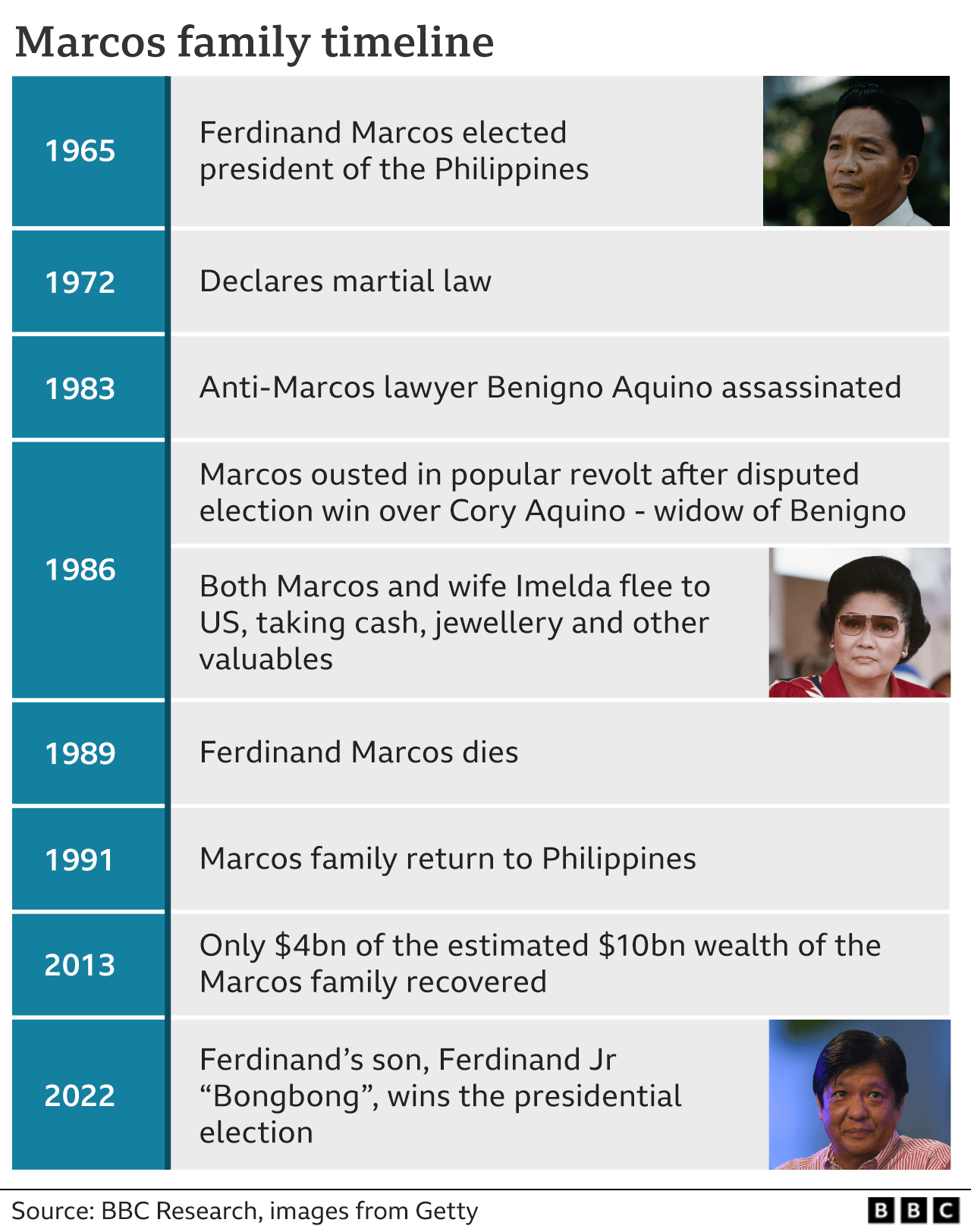
His partnership with the Dutertes will also be watched closely.
Bongbong has promised to continue President Duterte's controversial anti-drug campaign, but hinted that he would support less violent methods.
Sara Duterte, the president's daughter, is near-certain to win the vice-presidency, and her own popularity makes her a likely presidential candidate in 2028.
But President Duterte has not formally endorsed Marcos, nor is his relationship with his daughter always smooth.
The vice-president is elected separately from the president, and Ms Duterte may wish to use her position to propel her own political career.
However the post carries little power compared to that of the president. While formally allied in the campaign, they will need to agree on how to divide the spoils of office.
But there are some bigger questions.
How much corruption - always a problem in the Philippines - will there be under a family with the reputation of the Marcoses?
And perhaps the greatest concern will be over the fate of democracy and civil rights, both of which suffered under President Duterte.
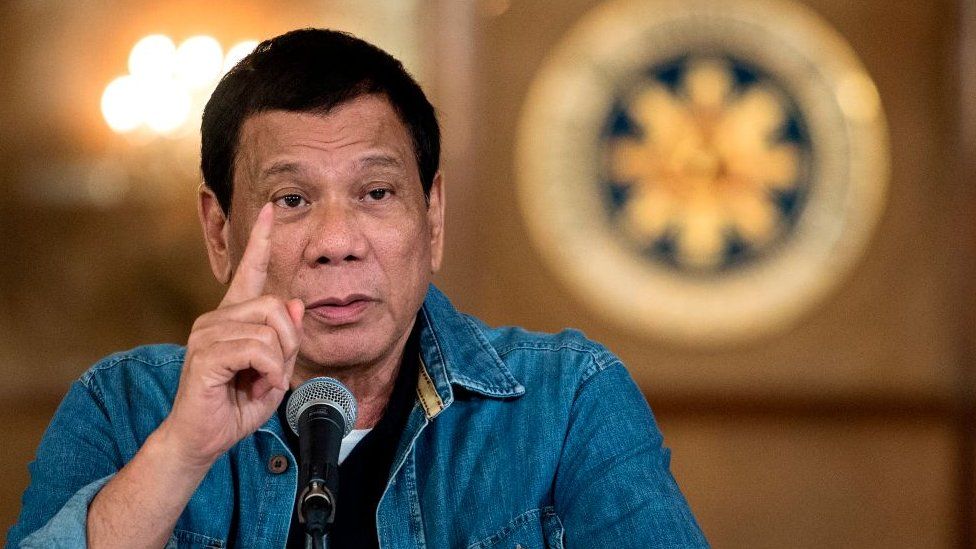
How will Bongbong deal with opposition to a Marcos administration? How free will the media be to keep investigating his family's past?
The Marcos campaign's open hostility to all but the most friendly media outlets is not an encouraging sign.
Voters in the Philippines have long shown a partiality to strongman rule, to roguish characters who promise to dispense with the messy compromises of democracy and get things done.
That explains the election of Joseph Estrada in 1998, and more recently in the 2016 of Mr Duterte, who made no secret of his impatience with democratic norms.
Bongbong Marcos does not have that kind of charisma, but he has run largely on refashioned memories of the strongman rule of his father.
His social media campaign has proved so successful there are fears this will now be the model for future elections in the Philippines, with the mainstream media sidelined, and a blizzard of fact-free narratives competing online.
His family's return to power also neatly bookends the optimistic age of globalisation. This arguably began when the US refused to support his autocratic father in the waning years of the Cold War, inspiring pro-democracy movements across the world.
It has now come to an end with the war in Ukraine, the breakdown of China-US relations, and the rise of populist leaders riding a tsunami of social media disinformation.


No comments:
Post a Comment